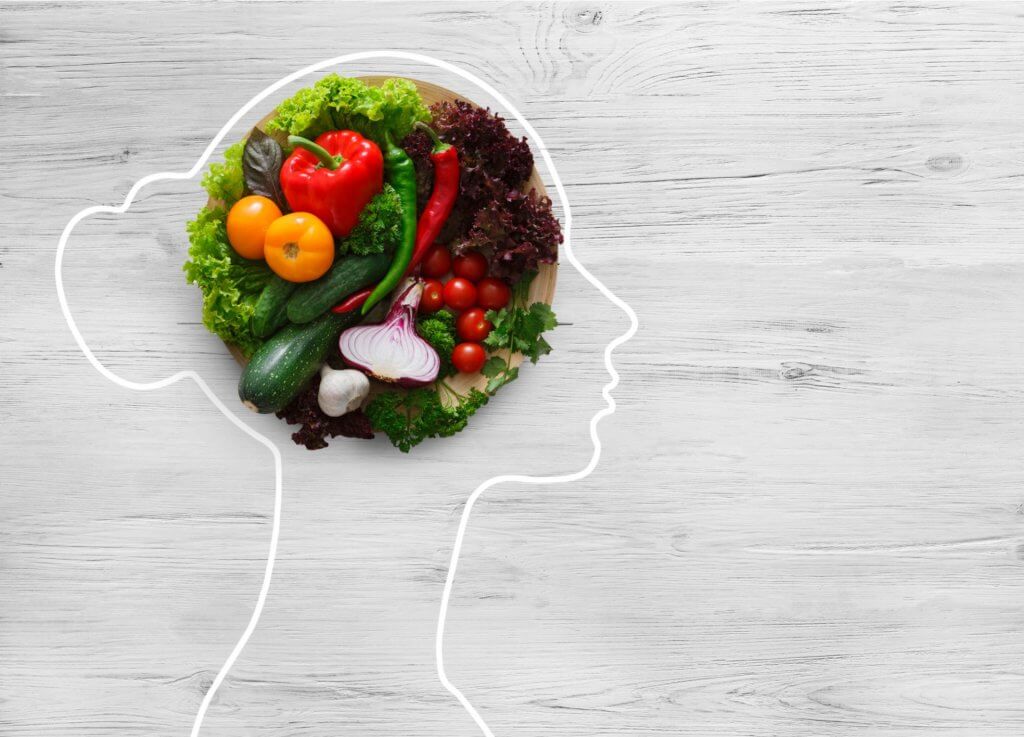
From Diet to Disease: How Food Drives Chronic Inflammation


Chronic inflammation affects the entire body–including the brain. If you have brain fog, memory issues, trouble concentrating, or any kind of cognitive impairment, don’t overlook the effects of diet and inflammation.
Researchers and scientists have understood for a while now that certain aspects of our diet are leading to an epidemic of chronic diseases–from heart disease to cancer to Alzheimer’s disease. Our modern diets are certainly a factor, but why?
Our hunter-gatherer ancestors ate a wide variety of whatever they could find, pick, or hunt, whenever it was available. We’ve evolved to harness nutrients from many foods, and even periods of starvation. As a result, our bodies have a fairly large buffer when it comes to nutritional stress–in other words, we’re biologically designed for diet ups and downs.
Instead of the varied diet of our ancestors, which naturally covered all of the nutritional bases, modern diets rely heavily on fried and processed foods and less on fruits and vegetables. This literally tips the scale by pushing the body beyond its capacity to adapt and igniting the long, slow burn of chronic inflammation.
The good news is that chronic diseases are largely preventable, and changing your diet can go a long way towards cooling down the inflammation.
But what exactly is inflammation, how does it relate to diet, and how can we control it?
Inflammation is good — until it isn’t
Inflammation is not inherently harmful. It’s a natural part of the immune system that the body uses to protect you against foreign dangers.
When the body detects something that shouldn’t be there, acute inflammation often occurs as part of the immune response. You’re probably familiar with this kind of inflammation, clearly visible after an injury in the form of redness, swelling, and pain. In a healthy person, the response is robust enough to meet the threat: it puts the body under stress in order to do what it needs to do. When the threat is gone, the body quickly returns to baseline.
But sometimes the body’s immune system doesn’t operate as intended. It’s as if a minor alarm is going off all the time, subjecting the entire body to constant, low-level stress and inflammation. That in turn leads to chronic disease. Comprehensive protocols, like in the Aviv Medical Program, take diet into consideration when personalizing hyperbaric oxygen therapy treatment protocols for brain and physical performance.

Runaway or chronic inflammation
Stress is actually a normal situation for the body; at least, on the cellular level. That even applies to oxidative stress, the kind created by free radicals and ultimately leading to chronic inflammation.
Our body naturally produces free radicals as a result of normal cellular metabolism and they have important jobs in the cell. After they perform their functions, antioxidant molecules help neutralize these reactive free radicals.
It’s about balance: as long as the body has enough antioxidants to neutralize the potentially damaging free radicals, the system runs well. But if something tips the balance, free radicals can build up and cause oxidative stress, which begins a vicious cycle.
Oxidative stress, when out of control, wreaks havoc on your cells. Free radicals are very reactive biochemically because they’re missing an electron, making them unstable. They will essentially rip an electron off any nearby molecule indiscriminately–even your DNA is susceptible. The cellular damage that results is then recognized by the immune system, which kicks off the inflammatory response, similar to that of acute inflammation. While they’re helping clean up the mess, however, immune cells like macrophages actually produce free radicals themselves, making the problem even worse.
Because the chronic immune response is comparatively weak compared to an acute response, it can easily go unnoticed and thus untreated, for a long time.
Health effects of chronic inflammation
The Center for Disease Control (CDC) reports that 6 in 10 adults in the US have at least one chronic condition. The CDC defines a chronic disease as “conditions that last 1 year or more and require ongoing medical attention or limit activities of daily living or both.” Here are some other facts about chronic disease and nutrition:
- One billion people in the world are overweight
- “Persistent conditions” are the number one cause of death and disability
- 15 million people die prematurely (between the ages of 30 and 69) every year due to chronic disease.
- The US spends $3.8 trillion on healthcare annually; 90% of those costs cover people with chronic mental and physical health conditions
- Fewer than 1 in 10 adults and adolescents get enough fruits and veggies
The World Health Organization (WHO) named chronic diseases as the number one threat to human health, citing just three critical risk factors: tobacco smoke, physical inactivity, and poor diet.
It’s probably no surprise that all of those factors can fuel the cycle of inflammation and lead to disease.
Beware of dietary shortcuts

So can’t we just take antioxidants to balance the free radicals?
Antioxidants became popular in the 1990s, when research first began to reveal that oxidative stress and inflammation were the culprit behind heart disease. Taking antioxidants seemed to be the perfect solution to counterbalance the free radicals produced by our modern diet.
In reality, a supplement pill cannot close the nutritional gaps our diets leave behind. From antioxidants to vitamin C, there are a few reasons why supplements aren’t the answer.
- Most people don’t need them. They were primarily developed for people with conditions that prevent them from consuming or absorbing nutrients properly. In the United States, you’re more likely to be susceptible to over-nutrition or getting too much food for the body to handle. You don’t need 100% of the recommended daily allowance (RDA) of vitamins and nutrients every single day. The body has adapted to tolerate huge fluctuations in nutrients; some nutrients can be stored for a month or more in your body.
- They can’t improve on nature. When creating a supplement for, say, fish oil, manufacturers would want to be careful to provide purified fish oil with no contaminants, fillers, or unknown variables. It’s the best way to ensure that someone who wants to add fish oil to their diet is getting just that, nothing else. However, this is exactly the opposite of the way that nature works. Most foods are combinations of hundreds of nutrients and many work better together than separately.
- They just don’t work. So far, studies have failed to show that supplements have any benefit for mortality. Moreover, there were some indications that supplements could be harmful in higher doses. Getting the same nutrients from food, however, did lower risk factors for disease and mortality.
Scientists can’t yet explain the exact reasons that supplementation falls inferior to food, but the studies show it nonetheless.
The MIND Diet
There are lots of anti-inflammatory diets out there, but if you want to focus on your cognitive health, check out the MIND diet.
The MIND diet, which stands for Mediterranean-DASH Intervention for Neurodegenerative Delay, combines two popular and scientifically proven diets (the Mediterranean and DASH diets, as the name implies) and was specifically developed to optimize the anti-inflammatory effects on the brain.

This diet has a lot of science behind it; modified from two plant-based diets that already have strong research behind them, it’s designed around foods that have proven to have cognitive benefits. Research on the MIND diet itself showed that it works, including 53% decrease in Alzheimer’s risk in older adults when they adhered to the diet.
It’s important to remember that sticking to a particular diet 100% isn’t the goal, and it’s not necessary to get benefits. Studies show it need not be all or nothing–those who followed the diet “moderately well” saw a 35% decrease in Alzheimer’s risk.
The MIND diet has numerous advantages, including its simplicity: it prescribes just 10 foods to eat, including dark leafy greens and other veggies, berries, nuts, olive oil, poultry and fish, and 5 foods to eat less of–including cheese, butter, fried food, red meat, and sweets.
The bottom line
It’s important to remember that any change in the right direction can impact your health. If all you did was find a way to eat a single, big handful of leafy green vegetables every day, you’d be getting a wealth of fiber, antioxidants, vitamins and minerals, and working to slow down the inflammation process that can lead to chronic disease.
Researchers are learning more and more about the link between cognition and dieting. As you age and the risk of developing memory disorders like dementia increase, laying a firm foundation for healthier eating will become vital to maintaining quality of life.
As leaders in brain performance, the expert clinicians at Aviv Clinics help keep your mind and body healthy for years to come. With hyperbaric oxygen therapy (HBOT) at its core, cognitive and physical training, and nutrition coaching, the ground-breaking Aviv Medical Program enhances cognitive and physical function and triggers the body’s natural capabilities at self-regeneration.
Contact us for a free consultation and learn about how our nutritional coaching will enhance the benefits of the Aviv Medical Program.
Aviv Medical Program provides you with a unique opportunity to invest in your health while you age.


